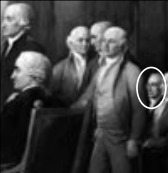The Kentucky Statute by David Barton

A carving of Moses holding the Ten Commandments, if that is
the only adornment on a courtroom wall, conveys an equivocal unclear and
uncertain message, perhaps a respect for Judaism, for religion in general, or
for law. It was striking that in Stone the Supreme Court completely ignored the
facts which led both the Kentucky legislature and the federal district court to
acknowledge the secular importance of the Ten Commandments. This unprecedented
rejection of fact by the Court drew sharp criticism from Justice Rehnquist in
his dissent:
The Court concludes that the Kentucky statute involved in
this case "has no secular legislative purpose," and that "the preeminent purpose
for posting the Ten Commandments on schoolroom walls is plainly religious in
nature." This even though, as the trial court found, "the General Assembly
thought the statute had a secular legislative purpose and specifically said
so." The Court's summary rejection of a secular purpose articulated by the
legislature and confirmed by the State court is without precedent in
Establishment Clause jurisprudence. This Court regularly looks to legislative
articulations of a statute's purpose in Establishment Clause cases. The Court
rejects the secular purpose articulated by the State because the Decalogue is
"undeniably a sacred text." It is equally undeniable, however, as the elected
representatives of Kentucky determined, that the Ten Commandments have had a
significant impact on the development of secular legal codes of the Western
World. The trial court also concluded that evidence submitted substantiated
this determination.
Certainly the State was permitted to conclude that a
document with such secular significance should be placed before its students,
with an appropriate statement of the document's secular import. Almost as
amazing as the Court's claim that the Ten Commandments lacked secular purpose
was the Court's complaint of what would occur if students were to view the
Commandments:
If the posted copies of the Ten Commandments are to have
any effect at all, it will be to induce the schoolchildren to read, meditate upon,
perhaps to venerate and obey, the Commandments. The Court therefore concluded:
This is not a permissible state objective under the
Establishment Clause. The mere posting of the copies the Establishment Clause
prohibits. The Founding Fathers would have disagreed vehemently.
David Barton's Blog
- David Barton's profile
- 256 followers



